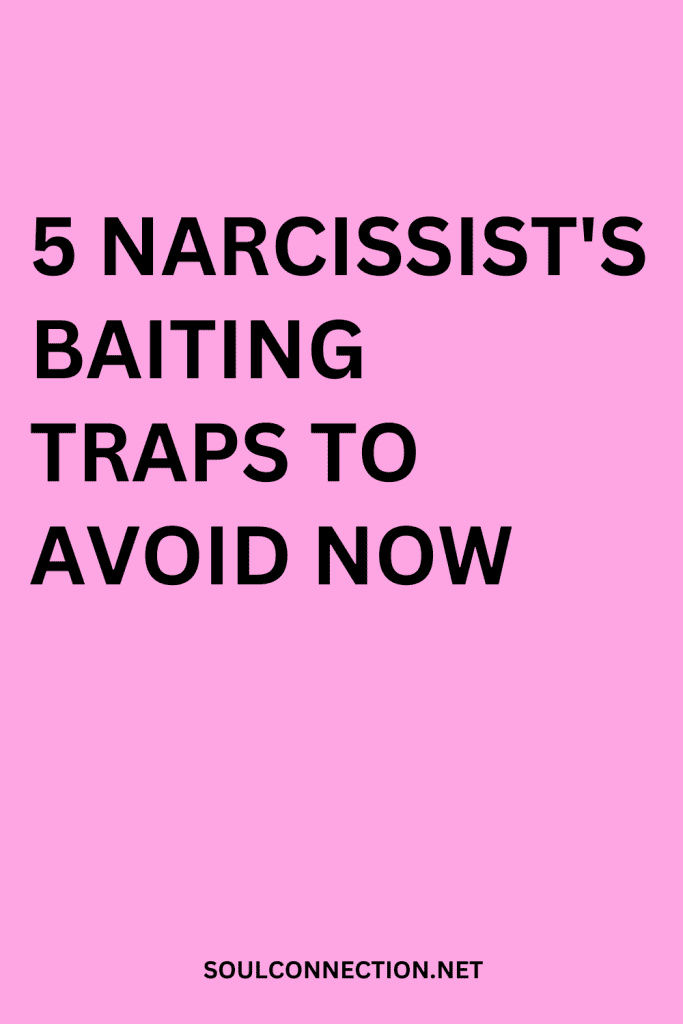Not every landmine in a relationship comes wrapped in a big red flag.
Sometimes, the most treacherous traps are a little less obvious—especially when you’re dealing with narcissists, those Olympic-level manipulators with a PhD in pushing your buttons.
Before you know it, you’re caught, second-guessing your sanity, wondering if you’re the drama. (You’re not.)
Let’s shine a spotlight on five classic baiting traps narcissists love to set—and, more importantly, how to step over them without losing your cool, your self-respect, or, ideally, your car keys.
1. The “Just Joking!” Insult
Here’s a familiar scenario: your partner drops a snide little comment about your appearance, intelligence, family, or the way you eat spaghetti. You freeze, feeling the sting, only to be met with, “Relax, I was just joking! You’re so sensitive.”
This is a narcissist’s bread and butter. The “just joking” trap is a license to be cruel while blaming the victim for not getting the non-existent joke. It’s a handshake deal with gaslighting: you’re the one with the problem, not them.
How does one dodge this trap? Simple, but not always easy: refuse to explain why you’re hurt. You do not have to defend your emotions or convince anyone your feelings are valid. Instead, calmly state, “That wasn’t funny to me,” and move on.
No emotional fireworks, no lecture, just a factual statement with a side of indifference. Narcissists thrive on reaction; don’t feed the beast.
And if your partner doubles down, insisting you lighten up? That’s your cue: this is about their lack of empathy, not your lack of humor. You’re not auditioning for their comedy club.
2. The “Let’s See You Lose It” Game
Narcissists love a show, and nothing gets their popcorn popping faster than triggering your emotions and then sitting back with a smug smile.
They’ll poke, prod, and provoke until you finally snap—then point at your reaction as proof that you’re unreasonable, unstable, or “crazy.”
The classic setup: they bring up a sore subject, break an old promise, or conveniently “forget” a major milestone. As your blood pressure rises, they feign innocence and, in a masterstroke of projection, accuse you of ruining the vibe.
If you call them out too loudly? Congratulations, you have now “proven” their story that you’re the difficult one.
The trick is to sidestep their invitation to the drama Olympics. Take a breath. If you can, step away (physically, if possible, or mentally, if you’re stuck at a dinner table).
Respond with quiet confidence, not volume. “I’m not going to argue about this,” works wonders, especially when paired with a well-timed bathroom break.
If you don’t give them a reaction, they have nothing to use against you. Save your drama for karaoke night, where it belongs.
3. The “I Need Your Help” Guilt Trip
Ever notice how a narcissist suddenly transforms into a helpless kitten the moment you try to set a boundary? Suddenly, your desire for a quiet night or a little space is met with a monologue about how they simply can’t manage without you.
You’re their “rock,” their “reason,” their… unpaid therapist and emotional support animal, apparently.
This form of baiting is all about making you feel responsible for their happiness—or more accurately, their lack of it. If you refuse to jump, you’re “cold” or “selfish.”
And, because most decent humans are at least a little allergic to guilt, you’ll wobble. Maybe you’ll cave.
Here’s the antidote: Recognize that grown-ups, even narcissistic ones, are responsible for their own feelings and choices. You’re not running a rescue center for emotionally stunted adults.
Respond with empathy, but don’t sign up for emotional labor. “I hear that you’re struggling, but I can’t fix this for you,” is a boundary with both compassion and backbone. Repeat as needed.
4. The “Everyone Agrees With Me” Trap
There’s nothing quite like a narcissist invoking an imaginary fan club. “All my friends think you’re overreacting.” “Even your sister said I’m right.”
Suddenly, you’re not just disagreeing with one person, but with an entire crowd—except, surprise, the crowd is either totally fabricated or has been selectively fed one side of the story.
This trap works by isolating you from your support system and making you doubt your own perspective. It’s classic divide-and-conquer.
Resist the urge to play detective and text everyone in your contacts list for confirmation. That way lies madness (and awkward group chats).
Instead, focus on your own gut. “That’s not how I see it,” is enough. You don’t need a jury of twelve to validate your experience.
If you do feel genuinely concerned that others are being roped in, have a private, direct conversation with them—not in the heat of the moment, and not with the narcissist lurking in the background.
Real friends don’t play messenger for manipulative partners.
5. The “You’re Just Like My Ex” Comparison
Narcissists wield comparisons like blunt instruments. Whether it’s “You’re just like my toxic ex” or “At least my ex never nagged me like this,” the goal is to make you feel inadequate, replaceable, or perpetually on trial.
This bait is designed to make you scramble for approval, to prove you’re better, different, worthy.
It’s a trap because it shifts the conversation from their behavior to your supposed flaws—or, better yet, your competition with someone who isn’t even present. (Bonus points if the ex was, conveniently, a “crazy” one.)
Time to step off this merry-go-round. Do not engage in the comparison Olympics. Avoid defending yourself or trashing the ex. “I’m not interested in being compared to anyone else,” is a velvet rope no narcissist can squeeze past.
If the comparisons keep coming, take it as a warning signal—not a challenge.
The less energy you spend auditioning for the role of Best Partner Ever, the less ammunition the narcissist has to keep the game going.
Reclaim the Remote to Your Own Mind
Baiting is a narcissist’s favorite party trick—designed to get a reaction, win control, and keep you dancing to their tune. The most powerful tool in your arsenal? Refusing to play the game on their terms.
Spotting these traps is step one. Refusing to leap into them is step two.
The path back to sanity doesn’t require a grand gesture or a viral TikTok speech—just a series of small, consistent choices to honor your own reality over their manufactured chaos.
If you find yourself tempted to explain, defend, or win the argument, pause. Breathe. Remember that your peace is not up for negotiation.
Tonight, try it: when the bait comes, leave it on the hook. There’s power in the pause, and sometimes, the most satisfying move is simply not taking it.
And if your narcissist still insists on fishing for a reaction? Remind yourself: you’re not the fish.
You’re the ocean.


